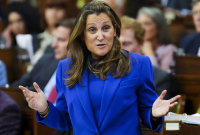Support strong Canadian climate journalism for 2025
A First Nation of fewer than 300 people in Yukon's north has used a law it created during the COVID-19 pandemic to bar a convicted sex offender from being sent to its community.
The Vuntut Gwitchin First Nation in Old Crow issued a declaration under its Community Emergency Act banning Christopher Schafer from the fly-in community nearly 800 kilometres north of Whitehorse for at least the next 90 days.
Chief Dana Tizya-Tramm said Yukon's territorial court decision to allow Schafer to live in Old Crow came via fax to the local RCMP detachment 24 hours before he was scheduled to arrive and was made without consulting the First Nation, which has limited supports available with only two RCMP officers and no clinical health staff.
“This action shows that although we may speak about reconciliation in this country, and we may feel it's important, the work is left to our communities, (which are) understaffed and under-supported,” he said at a news conference Tuesday.
Tizya-Tramm said when news hit the small community that Schafer, whom the First Nation called a "repeat violent sex offender," may return, “the emotions and the pain were visceral."
He said the emergency declaration was the only tool available to “slow this process down.”
“I'm not here to pass judgment on Mr. Schafer. I'm here to deal with the systematic problems in our justice (system) that does not allow our people … a modicum of influence in the larger cogs of the justice system, which is continuing to fail Yukoners and our Indigenous women across the country."
He said the community has previously attempted to reintegrate Schafer into Old Crow and provided the court with details of what supports would be required.
The chief said he is in contact with Schafer’s family and there is a willingness to work on another plan, but the community needs more time and support.
For now, Schafer remains in the Whitehorse jail and will appear in front of a judge Wednesday to continue discussions about his future.
Doris Bill, chief of the Kwanlin Dun First Nation in Whitehorse, said similar situations have happened in other small communities where people are released from jail without proper supports or reintegration plans.
“It has to stop. We have to give the communities the proper resources, in order to deal with these cases,” she said.
“They cannot be left out there to fend for themselves and to take care of these individuals without the proper expertise and the resources in place."
Tizya-Tramm said he wants an apology and a public inquiry into what happened. He has sent a letter to federal Justice Minister David Lametti, territorial Justice Minister Tracy-Anne McPhee and Michael Cozens, chief judge of the territorial court of Yukon.
“We do not and will never tolerate such institutionalized indifference which denies the Vuntut Gwitchin First Nation, our citizens and community of Old Crow — particularly Indigenous women and girls — of our inherent rights and freedoms to survive and live with dignity, well-being, peace and security on our land,” the letter says.
In a statement, a cabinet spokeswoman said McPhee would be responding to Tizya-Tramm’s letter.
A "hub," including counsellors and a mental health nurse based 400 kilometres away in Dawson City, supports Old Crow with staff travelling regularly to the community, the statement said.
“The department is working directly with Vuntut Gwitchin First Nation to co-ordinate mental wellness education and supports, in addition to the visiting counsellors, that aim to meet the specific needs of the community as well as Vuntut Gwitchin citizens in Whitehorse,” the statement said.
- By Ashley Joannou in Vancouver
This report by The Canadian Press was first published Oct. 11, 2022.




Comments